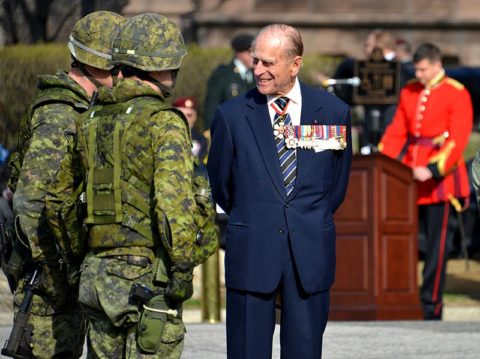Aris Roussinos outlines the surprisingly complex history of Prince Philip’s family in Greece and explains why His Royal Highness could never really be considered Greek, despite the tabloid nickname “Phil the Greek”:

HRH Prince Philip, the Duke of Edinburgh, Colonel-in-Chief of the Royal Canadian Regiment, presenting the 3rd Battalion with their Regimental Colours, 17 April 2013. (via Wikipedia)
Though most people know that Prince Philip was born in Greece and almost immediately exiled, the precise circumstances of this leaving of his native country are surprisingly obscure. How many are aware, for example, that if Ataturk had lost the 1921 Battle of the Sakarya River, outside Ankara, not only would modern Turkey not exist, but neither would Princes Charles, William and Harry?
The existence of our future kings is the chance product of the tumult accompanying the collapse of the Ottoman Empire. It is a dramatic illustration of the Butterfly Effect, whereby random events on one corner of the European continent totally reshaped timelines on the other: indeed, we could declare the prime mover in the events that placed the Duke of Edinburgh as our Queen’s consort to be an aggrieved Greek monkey.
On 2 October, 1920, Prince Philip’s uncle, King Alexander of Greece, was taking the air in the grounds of the royal palace of Tatoi, outside Athens. His German Shepherd dog, Fritz, attacked a Barbary Macaque belonging to a member of his staff. As the King rushed to extract the screaming monkey from Fritz’s jaws, the macaque’s furious mate sunk its teeth into the king’s leg. Alexander contracted sepsis, and died just over three weeks later, throwing Greece into a succession crisis, and totally reordering the subsequent history of the Near East. As Churchill later wrote, “it is perhaps no exaggeration to remark that a quarter of a million persons died of this monkey’s bite”.
King Alexander’s septic leg, like the rest of the Greek royal family, possessed not a drop of Hellenic blood — something Prince Philip reportedly made clear to a Greek visitor to Buckingham Palace who dared to claim ethnic kinship with his host. Back when the small Balkan nation finally won its independence from the Ottoman Empire, in 1831, the European Great Powers had decided on the Bavarian Wittelsbach dynasty to rule the poor and volatile Greeks. When the Wittelsbach King Otto was forced from his throne by the revolution of 1862, the Great Powers reconvened, and chose the 17-year old Prince William of Denmark, Prince Philip’s grandfather, as Greece’s new king. As he would later instruct his children, “You must never forget that you are foreigners in this country, but you must make them [the Greeks] forget it.”
After the disastrous war against the Turks, six military leaders were tried and executed by firing squad, and Prince Philip’s father Prince Andrew, was accused of disobeying an order while in command of a Greek corps:
As the historian Michael Llewellyn-Smith noted in his excellent book on Greece’s Asia Minor campaign Ionian Vision, “whether or not Andrew had been guilty of insubordination, it was an absurd charge to bring fifteen months after the event, given that he had not been relieved of his command at the time.” On 3 December, Andrew took the stand. A staff officer, Colonel Kalogeras, stated that Andrew had refused to attack despite direct orders. Colonel Sariyannis and General Papoulas both attested that if Andrew had carried out Papoulas’ orders, the Greeks would have won the day at Sakarya. Andrew was unanimously found guilty of disobedience and abandoning his post and sentenced to be stripped of his rank and banished permanently from Greece.
Andrew expected to be executed in his cell at any moment. However, in the background, the Greek revolutionary General Nikaloaos Plastiras, a future three-time Prime Minister of Greece, had been negotiating with the British government, which had broken off formal diplomatic relations with Greece since the execution of the Six. They agreed that Andrew would be permitted to leave Greece on a British warship.
And so, a few months after his birth, Prince Philippos of Greece left Mon Repos, Corfu and Greece on the British destroyer HMS Calypso, along with his mother and father and into a life of exile. Philippos was, famously, carried onto the warship in an orange crate instead of a cot. His father Prince Andrew settled into a life of exile in France, writing a book Towards Disaster, translated by Philip’s mother Princess Alice, which aimed to justify his actions at Sakarya as necessary to avoid a pointless loss of life in a losing battle. When the monarchy was restored in Greece, Andrew refused a commission for Philip in the Hellenic Navy, saying “Never the Greek Navy! In the Greek Navy after a bit they would throw him out – that’s what they did to me, not once, as you know, or twice, but three times!”
Instead, Philip served gallantly in the Royal Navy during the Second World War, and was awarded the Greek War Cross for his actions at Cape Matapan. While his son Prince Charles became a benefactor of the Greek monastic republic of Mount Athos and frequent visitor to Corfu, and who is widely considered to be a Phillhellene with a strong mystical attachment to the Greek Orthodox faith of his grandparents, Prince Philip described himself as “a discredited Balkan prince of no particular merit or distinction”. For despite his nickname as “Phil the Greek”, he felt no great affection for the country and the uneasy crown it offered its foreign rulers. As he once said of the land of his birth and the mercurial people it contains, “I certainly never felt nostalgic about Greece. A grandfather assassinated and a father condemned to death does not endear me to the perpetrators.”



